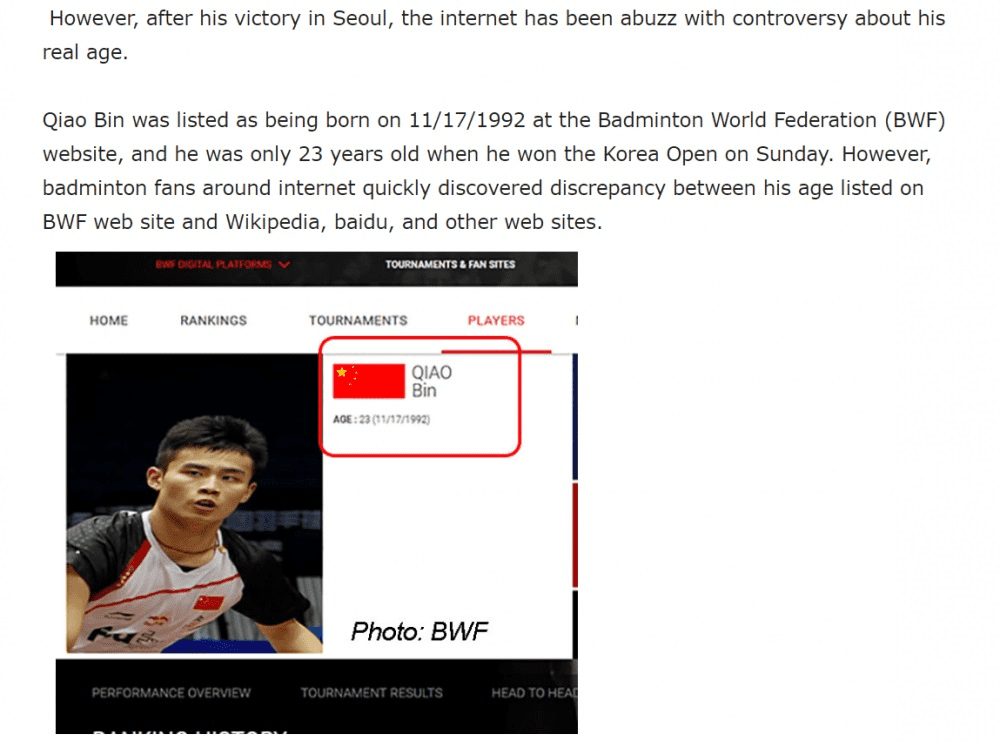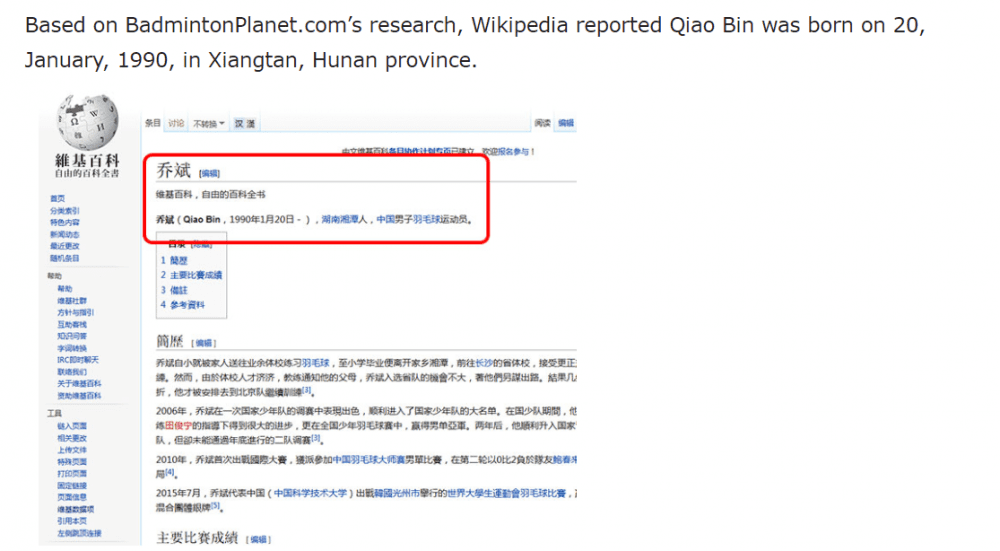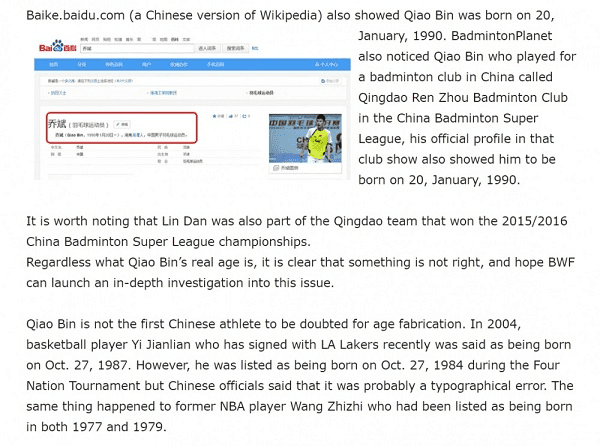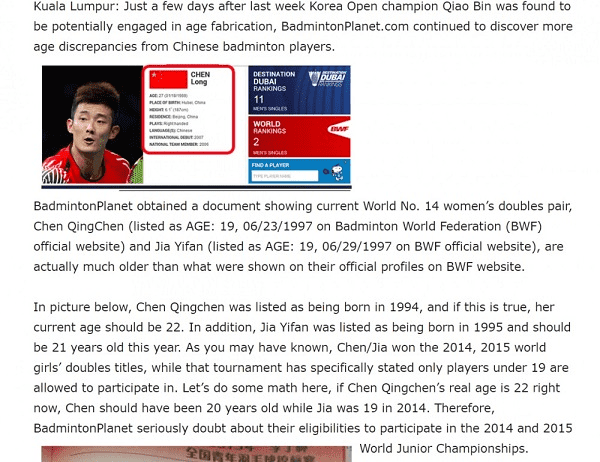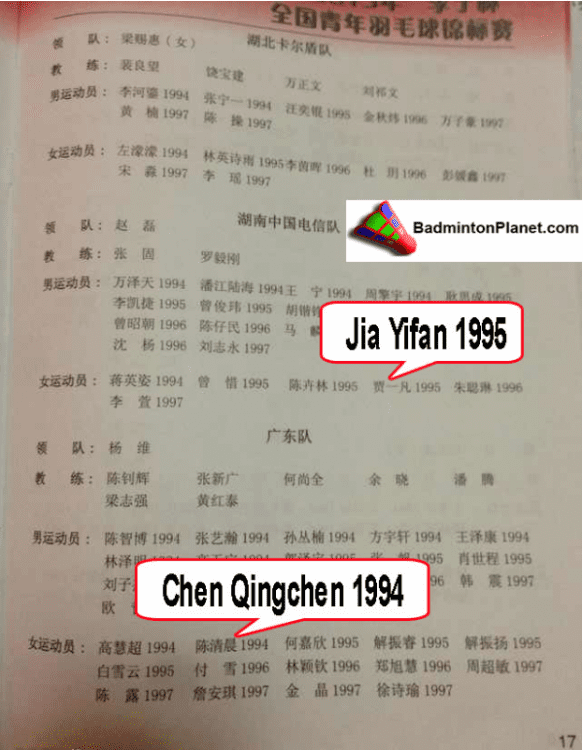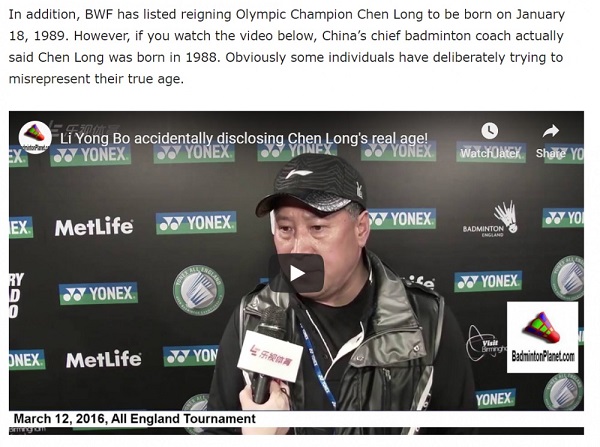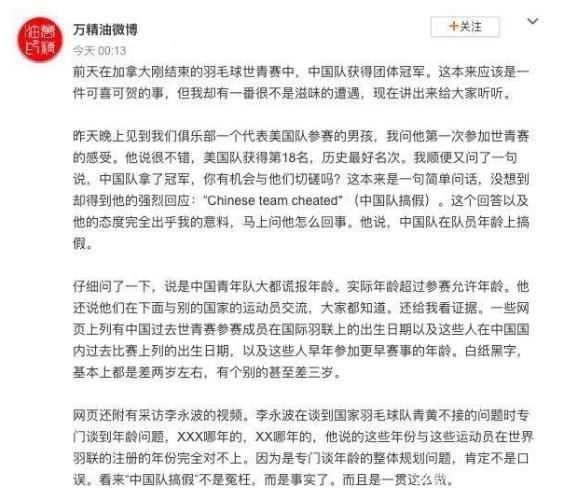-
Register/Login on Totallympics!
Sign up to Totallympics to get full access to our website.
Registration is free and allows you to participate in our community. You will then be able to reply to threads and access all pages.
If you encounter any issues in the registration process, please send us a message in the Contact Us page.
We are excited to see you on Totallympics, the home of Olympic Sports!

up and down
Totallympics Medallist-
Posts
1,002 -
Joined
-
Last visited
Content Type
Forums
Events
Totallympics International Song Contest
Totallympics News
Qualification Tracker
Test
Everything posted by up and down
-
http://sports.sina.com.cn/o/2007-11-11/17543286194.shtml 开除世界冠军到叶钊颖让球 李永波:不想伪装自己 http://sports.sina.com.cn 2007年11月11日17:54 新浪体育 新浪体育讯 李永波,中国羽毛球队总教练,他执教期间为中国队夺得了八枚奥运会金牌,培养了56个世界冠军弟子,现在,他正率领中国羽毛球队朝着北京奥运会发起冲击。 “感谢支持我的人,感谢反对我的人,有那样的举动,才使得我变得更强,否则我不会变得更强。”李永波回忆执教十几年的风风雨雨时用了这一句话来总结。 2000年悉尼奥运会是李永波最艰巨的考验,1998年部分队员和教练认为李永波工作和经济上存在问题,部分教练甚至退出了国家队。“今天为止我也不会怪我的那些队员,队员是无辜的,他们参与过反对我,而是我把他们培养成世界冠军的,他们带着阴影生活,怎么会幸福?现在我对那些队员都很原谅他们,包括孙俊他们,他们当时还年轻,年轻是要付出代价的。”李永波说道。1999年四月初,国家体育总局确认李永波不存在经济问题,仍然担任中国羽毛球队总教练,历经一年的风波才日渐平息。 悉尼奥运会上,当时中国第一混双刘永/葛菲的出局让李永波倍感压力,这是张军/高崚横空出世,淘汰了世界第一组合金东文/罗景民,“张军高崚他们那时候连前八名都不是啊,去的目的就是冲,打什么样算什么样,这么一个目的,替雅典奥运会做准备的。”李永波对张军高崚淘汰世界第一组合金东文/罗景民之后的表现说道。 2000年9月18日,这是个值得铭记的日子,那天张军高崚赢了,孙俊也赢了,驱散了笼罩在中国羽毛球的阴霾,李永波的执教压力得到了释放,这天也是他的38岁生日。“你们场上的表现时给我最好的生日礼物。”李永波执教七年最感慨万千的时刻,酸甜苦辣都涌上心头。 1993年退役之后的李永波经过再三考虑选择了留在国家队当教练,作为大连人的他性格外向,国家队内很多教练认为性格张扬的李永波不合适当国家队教练。“当时很多国家队教练反对我做教练,觉得我做不了一个好教练,性格外向,脾气大。”李永波说道,“加上我是北方人,他们不太愿意一个东北人,因为有中国羽毛球的那一天,都是南方人主宰的,没有北方人的位置,北方人不会打羽毛球。”当时总教练王文教的支持下,李永波终于成为了男双教练组的一个普通教练。这时的中国羽毛球队陷入低潮,内部正在酝酿一场重大变革。 1993年中国羽毛球队赛场上的成绩出现了大幅度下滑,教练组体现出了执教能力,老化上的问题,当时体育总局准备用新中国自己培养的教练,对教练组进行大换班。上任助理教练仅仅半年的李永波成为了副总教练,“我做一年,做得好,当总教练,做得不好,就再找一个新的总教练。”李永波这样解释自己当初的那个决定。 “心里面打鼓,很多东西不知道从哪里下手。”李永波承认自己经过了一段时间才适应这个角色,“每个决定都要琢磨很久,苦思冥想,要怎么样让他们接受。”李永波刚上任时的训练方法受到了一些世界冠军的质疑,李永波不得不痛下决心:“我知道我不管,羽毛球队就完蛋了,只能硬碰硬,不是你死就是我活,所以我才会开除那些世界冠军,那是没办法了,我必须开除,经过再三的劝告,没有办法,必须开除。他们不恨我吗?他们当然会恨我。” 1994年广岛亚运会,蝉联五届的尤伯杯,整整一年在冠军领奖台上都看不到中国人的身影。一年后,33岁的李永波率领中国羽毛球队参加 苏迪曼杯羽毛球赛,出人意料地夺得了冠军。这座苏迪曼杯不仅是中国羽毛球队由衰转盛的转折点,也是李永波教练生涯的转折点,这次胜利使得中国羽毛球队重试信心,使得李永波赢得了更多信任和肯定。紧接着,中国羽毛球队夺得了奥运金牌,葛菲/顾俊夺得首金,董炯也历史性地站上亚军领奖台。 9月21日,最大黑马张军/高崚站到了混双决赛赛场上,这枚金牌的归属很大程度上将影响中国羽毛球队的士气,他们背负着中国羽毛球队的命运。第一局张军/高崚只拿掉1分,1比15落败。“第一局我跟他们说放慢节奏,不要去抢,用球的弧度和时间来破坏对方的节奏。”李永波现场指导。第二局13比13时张军高崚连续得分,扳平比分。第二局结束后李永波再度改变了战术,最终张军/高崚拿下了这枚赛前想都不敢想的金牌,创造了最大的奇迹和最激动人心的时刻。“他们的技术还不是很完美,技战术运用不能说是世界第一。但是他们的意志品质和精神应该讲是最好的。”李永波难以控制情绪,哽咽了,眼眶中难以抑止泪水。 混双决赛后的女单半决赛结果就给了李永波一个难题,丹麦选手马尔廷淘汰了戴韫率先进入决赛,另一场半决赛在两名中国选手之间进行。26岁的叶钊颖是中国战绩最佳的选手,1995年和1997年世锦赛冠军,头顶无数大奖赛和公开赛冠军头衔。23年的龚智超则是后起之秀,2000年一年就获得大奖赛和公开赛冠军。“你们俩一打半决赛,肯定累得你死我活,不论谁赢,对第二天决赛都是一个消耗,就没必要消耗这场球了。”李永波冷静地回忆到。 羽毛球队内部展开了慎重的讨论和谋划,1998年和1999年比赛的结果拿出来分析,叶钊颖输得多,龚智超基本没输过。马尔廷明显表露出不想打龚智超,因为龚智超的防守她无法突破,不好打。在中国羽毛球队的复兴路上,叶钊颖功不可没,获得过苏迪曼杯和尤伯杯等一系列世界冠军,近年始终是中国羽毛球的第一女单。 “执教这么多年,我不太赞成让球,每场让球都有人受到伤害,让谁让球心里都不太忍心。但在中国,我们最终目标是国家利益,叶钊颖和龚智超这场球,我们最终做出决定,动员叶钊颖让球。承诺如果龚智超赢了,给叶钊颖相同的待遇,奥运冠军的待遇。确实每个运动员都很难接受让球,当时叶钊颖也哭了,不愿意放弃,最后她还是哭着说尊重队伍的选择。”李永波也是感慨万千。 两局8比11的比分结束了叶钊颖的奥运征程,而此时龚智超还不知道这一切背后的事情,“我本身自己是运动员,知道付出了多少才站到冠军领奖台上,让任何一个人让球心里都很不忍心。”李永波对叶钊颖表示了感谢。最终果然龚智超击败了马尔廷,为中国队夺得了第14枚奥运金牌。之后的女双决赛,中国队包揽了前三名。 最后一枚男单金牌,李永波并未抱太大希望,最看好的夏煊泽半决赛不敌叶诚万。而进入决赛的吉新鹏奥运会前被教练组认为没有 竞争力,不被列入悉尼奥运参赛名单,一度被陈宏取代。“上午李富荣局长来宣布名单,半小时前我说这个名单要重新考虑一下,夏煊泽孙俊战胜这几个人(主要对手)有没可能?孙俊很难,夏煊泽没有全赢过,只有吉新鹏在上半年把他们都赢过,如果吉新鹏能发挥很好,都赢了么?教练听听也对,我就打电话给局长说,我们还要改名单,最终改了吉新鹏。”李永波的这个决定最终让中国男单首次登上了奥运最高领奖台。 “我有个性是有个性,我不想隐藏自己,大家觉得我很张扬似的,我也没有张扬到哪里去,我只是不想伪装自己,活得那么累。”这位将中国羽毛球队从低谷带上巅峰的总教头和羽毛球紧紧地联系在了一起,“可能一生都不会离开羽毛球,不管是一线还是退下来,都不会离开羽毛球,他已经属于我的生命了。” PS ; If someone can be kind enough to do a translation for the article above, I will be very grateful. Thank you.
-
https://www.reuters.com/article/us-oly-badm-bdwdob-group-day4/match-fixing-causes-badminton-chaos-idUSBRE86U1NA20120731 Match fixing causes badminton chaos LONDON (Reuters) - The London Olympics badminton tournament was thrown into chaos on Tuesday after opposing teams in two separate women’s doubles matches both appeared determined to lose their final preliminary group matches, prompting organizers to launch a probe. Spectators at Wembley Arena jeered China’s world champion doubles pair Yu Yang and Wang Xiaoli, and South Korean duo Jung Kyung-eun and Kim Ha-na as all four players took turns at missing routine shots to concede points in the match, prompting disquiet from the crowd at Wembley Arena. A technical delegate told Reuters tournament organizers had formed a review panel to investigate the match and held out the threat of serious sanctions. Moments after the review was confirmed, the match between South Korea’s Ha Jung-eun and Kim Min-jing and Indonesian pair Greysia Polii and Meiliana Jauhari also descended into farce as the teams played out the same scenario. A tournament referee came onto the court and appeared to disqualify both pairs of opponents in the second match, but the team’s coaches implored to be allowed another chance. The match was played out with the referee watching intently for any repeat of the behavior and the South Koreans won 18-21 21-14 21-12. All teams involved had already qualified for the quarter-finals, though South Korea head coach Sung Han-kook pointed the finger at the Chinese team. The result of the first match means China’s world champion duo will only meet the country’s number two pair if both teams reach the final. “The Chinese started this. They did it first,” an ashen-faced Sung told reporters through an interpreter. “It’s a complicated thing with the draws. They didn’t want to meet each other in the semi-final.” Sung said after the Chinese set the precedent, the South Korean pair in the second match deliberately emulated the Chinese tactic because they did not want to face their team mates in the quarter-finals. “Because they don’t want to play the semi-final against each other, so we did the same. We didn’t want to play the South Korean team again,” he said. “They (the BWF) should do something about (the format).” REVIEW PROMISED Paisan Rangsikitpho, a technical delegate at the tournament, told Reuters before the second match that there would be a review and held out disqualification from the tournament as a potential maximum punishment. “We will have a real discussion tonight to see what has happened,” he told Reuters. “If it’s true what I hear, this is a shame and I don’t like it. And I’m not going to accept anything that I don’t like at all. It’s not in a good spirit. “It is (embarrassing) at the Games. I apologize to the public, I apologize for everyone and I am not happy. “If we have to stay up all night, we will have a serious meeting.” Fans booed as shuttle-cocks were hit long in both matches with serves dumped into the net. China’s Yu claimed she and her partner were just trying to conserve their strength for the knockout rounds. “Actually these opponents really were strong. This is the first time we’ve played them and tomorrow it’s the knockout rounds, so we’ve already qualified and we wanted to have more energy for the knockout rounds,” she told Reuters. “Really, it’s not necessary to go out hard again when the knockout rounds are tomorrow.” Her South Korean opponents declined to comment. Other players at the tournament expressed their disdain at the situation. “If it was the case they wanted to purposefully lose, then it’s a big shame ... It’s absolutely stupid and shameful sport, basically,” said Germany’s men’s singles player Marc Zwiebler. “I can understand the motives but that they have the guts to actually stand in a crowded hall and put such shame in the game, it’s such a bad image of badminton.”
-
Thank you for your good suggestions.
-
Badminton pairs expelled from London 2012 Olympics after 'match-fixing' scandal All eight badminton players accused of attempting to throw their matches in the women’s doubles on Tuesday night have been disqualified from the London Olympics, Telegraph Sport can disclose. Out of the Games: an official talks to Indonesia's Greysia Poli and her coach after issuing a black card to the pair during their controversial match with South Korea Photo: AP The eight players from four teams in the women's doubles competition have been thrown out following an inquiry by the Badminton World Federation in London on Wednesday morning. The expelled players include Chinese World Champions Wang Xiaoli and Yu Yang, who were accused by other players of attempting to throw their ‘dead rubber’ in order to avoid playing China’s No 2 ranked pair before the gold-medal match. The Chinese actions appear to have triggered a response from pairs from South Korea and Indonesia, who in turn tried to lose to subvert the Chinese plan. Since the announcement, Indonesia and South Korea have announced they will appeal the decision though China have yet to say if they will or not. The issue is a major embarrassment to the sport and the Olympics, and prompted strong action from the BWF, which has seen a high number of games affected by withdrawals from matches between Chinese players and pairs in the last year. The WBF met this morning after charging Wang and Yu, Greysia Poli and Meiliana Jauhari of Indonesia and two South Korean pairs, Jung Kyung-eun and Kim Ha-na, and Ha Jung-eun and Kim Min Jung, of not using their “best efforts” to win the matches. The four pairs were due to meet in quarter-finals on Wednesday afternoon and it remains to be seen how the tournament will be restructured with half the draw now disqualified. The International Olympic Committee has taken unprecedented steps to tackle match-fixing in the London Games, with president Jacques Rogge describing it as the biggest threat to the integrity of the Games. There is no suggestion of any betting associated with the matches, but the fact players appeared willing to manipulate results is arguably more corrosive to the reputation of the Games. Rogge was a spectator at the badminton at Wembley Arena on Tuesday and the developments in the evening session are a a significant embarrassment to the sport and the Games. The badminton is being played in a round-robin format for the first time in an Olympics, leaving the potential for ‘dead rubbers’ to be manipulated. South Korea head coach Sung Han-kook admitted his two pairings attempted to throw their matches against the Chinese and Indonesians, but said it was in retaliation against the Chinese team who instigated the situation. It led to the farcical spectacle of both teams in both matches trying to lose. The players were jeered and booed by spectators as they apparently deliberately missed, and served out of court. "The pairs have been charged ... with 'not using one's best efforts to win a match' and 'conducting oneself in a manner that is clearly abusive or detrimental to the sport'," the WBF said in a statement. Spectators at the Wembley Arena shouted abuse and jeered at the players amid farcical scenes as the teams deliberately sprayed shots and duffed serves into the net to concede points. "The Chinese sports delegation take the incident in the women's badminton doubles very seriously," a team official told state news agency Xinhua. "After the delegation's leadership learnt about it, they immediately tasked the relevant people with an investigation. The Chinese Olympic Committee has always advocated the fostering of the Olympic spirit on the playing field as well as the spirit of fair and just competition. China "opposes any behaviour or acts which contravene this spirit or sports morality for any reason or in any form", the report added.
-
Badminton match-fixing scandal: how and why the four pairs were disqualified from the London 2012 Olympics With four badminton pairs sensationally disqualified from the Olympic Games for deliberately throwing their matches, Telegraph Sport looks at how and why the situation arose. So how come spectators were forced into watching a farcical set of matches? Badminton chiefs introduced a preliminary pool round for this Olympicsafter starting the tournament with knockout rounds in previous Olympiads. It was clear then that there could be a myriad of problems. Sure enough they arose in the women's doubles on Tuesday evening after China's world champion duo and pairs from South Korea and Indonesia purposely lost points in their final group matches to earn a favourable draw in the last 16. Are there previous incidents of players clearly throwing matches? Not half. Speak to players and officials and they will tell you of a spate of incidents each year on the world tour. As far as the Olympics go, the highest-profile case remains Athens 2004 when Li Yongbo, China’s head coach, admitted to ordering a player to throw a tie, improving chances of gold. It occurred during the women’s singles semi-final when Li decided that Zhang Ning would have a better shot at winning the final against a non-Chinese opponent rather than her opponent Zhou Mi. So it is more prevalent with all-Chinese encounters? Statistics – compiled by the online magazine Badzine – for all major tournaments in 2011 revealed that walkovers and uncompleted matches were commonplace. Chinese shuttlers, favourites to sweep all five golds at these Games, met each other 99 times on the circuit in 2011. Of those, 20 matches were either not played (11 walkovers) or partially completed before one of the opponents retired. When Chinese met other nations, the percentage of withdrawals dropped to 0.21 per cent. Can we call it match-fixing? China will tell you differently, but four years after the Athens debacle, Li said it "showed our patriotism and in fact I am proud of it”. In the Olympics, only two entries from each nation can compete. China’s dominance outside of the Olympics means that the latter stages of Super Series events are filled with their players and more of a chance of manipulating matches. The problem with group-stage matches is that the teams believe they are exploiting a loophole in the system of keeping players fresh, rather than fixing matches for betting purposes. What do the players think about the debacle? Chris Adcock, Britain’s doubles’ specialist, told Telegraph Sport in February that it was “frustrating” to see so many games “clearly thrown”. Adcock alluded to one particular match at last year’s World Championship semi-final involving two Chinese pairs, which failed to go the distance. Adcock and his partner Imogen Bankier reached the final but looked tired. Not surprisingly their 'fresher' Chinese rivals won gold. What is being done about the whole issue? Before the Wembley furore, world badminton chiefs said they were continuing to monitor same-country matches after a number of complaints from federations. The crux was that no official explanations were given as to particular withdrawals, while there was no independent doctor to assess injuries. The Badminton World Federation said in August that it would impose “severe penalties”, but up until now none had been imposed.
-
The national association for badminton in Denmark says the sport's world federation should punish Chinese players for a match at last week's Fuzhou China Open which has been described as a “farce”. Bo Jensen, director of Badminton Denmark, wants the Badminton World Federation (BWF) to take action after seeing footage of a quarter final match in which He Jiting and Ta Qiang defeated Li Junhui and Liu Yuchen in three sets. “I am giving my support to the criticism. This is cheating, it's match-fixing and we can't accept it,” Jensen said to TV2 Sport. “In our context, this is just as bad as doping, and it must be punished because if it is not, we will damage the sport's reputation amongst fans and the many sponsors that are making huge investments at the moment,” he added. Several Danish badminton players are reported to have been present during the match. Doubles pair Mads Pieler Kolding and Mads Conrad-Petersen lodged a complaint with tournament organisers following the match about the way it had been played. Another player, Hans-Kristian Vittinghus, later posted an update on Facebook in which he compared the match to a scandal during the 2012 Olympic Games in London, when eight players from China, South Korea and Indonesia were disqualified for deliberately trying to lose. “This was a complete farce of a match which made me think of the London Olympics when 4 pairs deliberately tried to lose their matches. I kid you not, it was this bad,” Vittinghus wrote, citing errors in play that “just (don't) happen at this level”. “Difficult to get hard evidence, but if you have watched a bare minimum of world class badminton, you'd know what just happened,” he also wrote. The BWF told TV2 Sport that it would not comment on the issue prior to receiving a report from the tournament's organisers.
-
Match fixing in China is never ending. There are more than thousands and even millions of articles about how China system fixed up matches under the order of Li Yongbo who is also the head coach for 24 years in China badminton. Anyway I think I will not post all the articles here. There are way too many articles. I just post some of them here only.
-
China Coach Admits to Fixing Olympic Match It is one of the worst kept secrets in international badminton. Actually, it applies to many sports. When China have more than one world-class athlete in the same sport, you can expect some unusual results. According to an AFP article recently, China's badminton head coach, Li Yongbo, has admitted ordering a player to throw a crucial match during the 2004 Olympic Games. Li told China Central Television's sports channel that the semi-final women's singles between Zhou Mi and Zhang Ning was fixed so that China could improve their gold medal chances. The coaching staff had decided, after watching the first game, that Zhang would have a better chance at winning the final against a non-Chinese player instead of Zhou. He was quoted as saying: "After the first game, Zhang looked in better all round shape. So we told Zhou Mi not to work too hard and let Zhang into the final." Badminton is not the only sport where China is suspected of telling their players to throw matches. Table tennis is another one. For many years, spectators, other coaches and players frequently observed some Chinese players suddenly refuse to try against compatriots in key matches of important tournaments. Sometimes it is to give the player who is in good form a better chance of winning a title and other times, if the final itself is between two Chinese players, it is to give new blood a taste of glory. This may be frowned upon in most countries but Li said China had nothing to be ashamed about. It was an act of patriotism. "It shows our patriotism and in fact I am proud of it." Zhang went on to win the gold medal in Athens and she is expected to defend her title at the Beijing Olympic Games in August. Zhou, however, quit the Chinese team and went to Hong Kong and wants to represent the former British colony at the Beijing tournament. If Zhou and Zhang meet again, don't look for revenge though. There are often "secret" deals between China and their ex-players, especially the ones who immigrate to Chinese territory's Hong Kong and Macau. Media in those countries say there is an unwritten law that players who have left China are not allowed to beat their mainland counterparts for a certain number of years, especially in big tournaments such as Olympics and world championships.
-
Ye Zhaoying wrote on the social network: The first time I saw a boy with a racket in a street by chance, he came up and asked all kinds of questions, then he had the desire to pick up the racket again. When he came to the club, he found that there were people playing in the club from childhood to old age. Because of the limitation of the venue and time, the club could only be full. The demand for more than 100 people is quite unexpected, because the club is still a Spanish team. How many times can life be crazy? On September 8, 2018, after 18 years of training, I picked up my favorite racket again and fought with boys and girls half my age. It was like a dream that I was back on the court again. It was something I had never dreamed of before. How many times could life be mad for me? I want to go crazy for it again. PS: I still have room for improvement, today I won a regrettable Club total points lost, looking forward to the next game. Born in 1974, Ye Zhaoying had long held the No. 1 position in the world in badminton womens singles. In her career, she won the Uber Cup three times for China, the Sudiman Cup twice, and the World Championships singles twice. But in her career, she failed to win the Olympic championship. Sydney Olympic Games The ball incident was also bubbling with excitement. Gong Zhichao and Ye Zhaoying won the gold medals and bronze medals in the Sydney Olympic Games. Ye Zhaoying and Gong Zhichao, two Chinese players, played together in the womens singles semifinal in Sydney in 2000, eventually lost the chance to attack the gold medal. In the past, in the two sides of the duel, Gong Zhichao has rarely won. Whether the result of the match was arranged ahead of schedule was once a hot topic of media attention. Later, Li Yongbo personally admitted to let the ball: But in China, our ultimate goal is the national interest, we finally made a decision to mobilize Ye Zhaoying to let the ball. Li Yongbo said, I tell Ye Zhaoying, you two play semi-finals, you must be exhausted, no matter who wins, the next days final is a consumption, there is no need to consume the ball. We promise that if Gong Zhichao wins, give Ye Zhaoying the same treatment and Olympic champions treatment. Indeed, it was very difficult for every player to accept the ball. At that time, Ye Zhaoying cried and refused to give up. Finally, she cried and said that she respected the teams choice. Ye Zhaoying and Gong Zhichao, two Chinese players, played together in the womens singles semifinal in Sydney in 2000, eventually lost the chance to attack the gold medal. In the past, in the two sides of the duel, Gong Zhichao has rarely won. Whether the result of the match was arranged ahead of schedule was once a hot topic of media attention. Later, Li Yongbo personally admitted to let the ball: But in China, our ultimate goal is the national interest, we finally made a decision to mobilize Ye Zhaoying to let the ball. Li Yongbo said, I tell Ye Zhaoying, you two play semi-finals, you must be exhausted, no matter who wins, the next days final is a consumption, there is no need to consume the ball. We promise that if Gong Zhichao wins, give Ye Zhaoying the same treatment and Olympic champions treatment. Indeed, it was very difficult for every player to accept the ball. At that time, Ye Zhaoying cried and refused to give up. Finally, she cried and said that she respected the teams choice.
-
Evidence of 'arranged' results between Chinese shuttlers All the rumourmongering about the Chinese seems to have basis in fact. Popular badminton website Badzine.net has analysed the statistics of China versus China matches this year and concluded that an astonishing 20 per cent of matches is not completed — that is, players have either not taken to the court, or retired midway citing injury or health problems. This essentially means that, apart from letting down ticket-purchasing spectators, Chinese players get an unfair advantage while progressing in the tournament. This is probably the most damning indication of the Chinese playing the game in poor spirit. Until now, nobody had taken the trouble to analyse past matches and make a strong case. Teams have mostly levelled allegations but the Chinese haven’t bothered to defend themselves, secure in the knowledge that nobody would have foolproof evidence or the political will to take them on. While the Chinese are the super heavyweights of world badminton, with no equals in sight, they don’t have too many friends on the circuit. Apart from their general aloofness, what has irked other nations consistently is the record of China versus China matches. It is commonly believed on the circuit that most of these matches are decided beforehand by the team management, particularly chief coach Li Yongbo. There is little the international community or the Badminton World Federation (BWF) can do about this, for such suspicions are not provable. But ‘pre-decided’ matches can be galling to viewers, especially if they have paid good money for tickets and are looking forward to a good day’s contest. Evidence has mostly been circumstantial. I recall the 2008 All England final between Lin Dan and Chen Jin in which Lin Dan mysteriously developed a knee problem halfway through the second game and went on to lose the match — but apparently the knee healed within a week, for he won the Swiss Open! Everybody in the media believed that Lin Dan had ‘thrown’ that match to enable Chen Jin to garner enough ranking points for the Beijing Olympics. Li Yongbo himself admitted in an interview to Chinese website Sina.com in 2008 that the Athens Olympics (2004) women’s singles semifinal, between Chinese players Zhang Ning and Zhou Mi, was allowed to go Zhang Ning’s way after she won the first game. Zhou Mi was instructed not to work too hard, so that Zhang could go fresh into the final. Zhang did win the gold, against Mia Audina of Indonesia. Yongbo’s admission created plenty of heat and dust, with the Badminton Players Federation calling for a ban on Chinese players, but the international federation hasn’t been able to do much. Most recently, at the French Open Superseries in October, Lin Dan and compatriot Chen Longplayed such a tame opening game that the audience booed at them. The Badminton World Federation had announced some measures in August, and promised that “if compelling evidence is found of any irregularities, the matter will be treated with the utmost gravity by the BWF and severe penalties will be imposed” but it is unclear how it can act, considering the kind of political clout China wields. Badzine’s analysis of all the matches in 2010 threw up interesting results. It reports: “Chinese shuttlers met each other 99 times on the circuit this year, and 20 matches were either not played at all (11 walkovers) or played partially before one of the opponents retired (9 retirements). This shows that 20.20% of matches between Chinese shutters were not completed in 2011.” This was in contrast to 0.74% of incomplete matches between the Chinese and other nations. In fact, just last week, a China vs China women’s doubles match, in the semifinals of the World Superseries Finals, resulted in a walkover. Indian fans will be interested to know that the Wang Yihan-Wang Xin semifinal match ended in straight games for Yihan, who went on to play Saina Nehwal in the final. The complexion of the final would doubtless have changed if Yihan had been stretched in a long three-game match. ‘Pre-arranged’ results in badminton is no less a crime than doping or match-fixing, for it devalues the contest. It will be interesting to see how BWF reacts to Badzine’s report.
-
China won 5 gold medals for MS, WS, MD, WD and XD at 2012 London Olympics.
-
BEIJING, March 22: China’s badminton head coach has admitted ordering a player to throw a crucial tie at the 2004 Olympic Games. Coach Li Yongbo told China Central Television’s sports channel that the 2004 Athens Olympics semi-final was fixed to improve China’s chances of winning a gold medal. Two Chinese players, Zhou Mi and Zhang Ning, were drawn together in the semi-final tie. After watching Zhang win the first game, the coaching staff decided that she would have a better shot at winning the final against a non-Chinese opponent rather than Zhou. “After the first game, Zhang looked in better all round shape,” Li was quoted as saying in a report on the interview by Sina.Com website. “So we told Zhou Mi not to work too hard and let Zhang into the final.” Li said he and the Chinese team had nothing to be ashamed of. “It shows our patriotism and in fact I am proud of it.” Zhang won the gold as planned and is expected to defend her Olympic title at the Beijing Games here in August. For her part, Zhou quit the Chinese team and went to Hong Kong. She is currently hoping to qualify to represent the territory in badminton at the Beijing Olympics. Li’s admission revived long-standing concern about behind-the-scenes arrangements at top international table tennis and badminton events by Chinese teams. The practice first surfaced in 1987, when He Zhili ignored an order to throw a semi-final to team-mate Guan Jianhua at the 1987 world table tennis championships. She went on to win the final, but was left out of the 1988 Seoul Olympic team as punishment. In badminton, suspicions are still rife about Wang Dan’s defeat to team-mate Chen Jin in the recent all-England final, with some experts suggesting that Wang threw the game.—AFP
-
How China fixes matches to remain badminton powerhouse In the semifinal of the Badminton Asia Championship in China last week, Olympic Champion Lin Dan was injured during the morning training session and forfeited his match against compatriot Chen Jin. Chen went on to win the title, which made a considerable contribution to his ranking points. The victory took Chen closer to his goal of breaking into the top-four in the world rankings before 3 May, a pre-requisite for him to qualify for the Olympics. According to the qualification rules, any country can field three singles players in the Olympics only if all three are in the top four in the world rankings after the qualification period ends on 31 April 2012. Under normal circumstances, the incident could have been ignored as a stroke of good luck for the 2010 World Champion, who is still struggling to cement his berth in the forthcoming London Olympics. But when such incidents involve two Chinese players the badminton fraternity cannot help but look at these developments with suspicion since the sport's powerhouse has been known to “fix” the result of such matches for a bigger goal. The biggest of such controversies had broken out when China’s head coach Li Yongbo once publicly admitted that he asked Zhou Mi (former world number one) to throw her 2004 Athens Olympics semifinal against compatriot Zhang Ning since he felt that the latter was more likely to get the better of Dutchwoman Mia Audina who had already booked her final berth. He had defended his decision saying Zhang had already won the first game in the semifinal and hence “as a patriot” he decided Zhou to take it easy and not try and win the match. In the last couple of years, Lin Dan has forfeited his matches twice against Chen Long to allegedly keep him fresh for a crucial match against Malaysian world number one Lee Chong Wei. He also forfeited the final of the Singapore Open Super Series last year against Chen, which ultimately helped the latter to gain valuable ranking points. In the 2011 Malaysia Open, there were quite a few walkovers in the all-Chinese encounters forcing the governing body, Badminton World Federation, to issue a warning to the coaching staff. Then the bigger goal for the Chinese contingent was to earn the full quota of qualifiers for the World Championship. In the same tournament, Xin Liu forfeited her women’s singles quarterfinal against Jiang Yangjiao citing a toe injury. That move not only helped Jiang, but also helped their men’s doubles pair as they were already warmed up when their match, scheduled immediately afterwards, was called while their Korean opponents were in for a surprise. For the last few years, former world and Olympic champion Taufik Hidayat of Indonesia has been petitioning the BWF to make stringent rules to curb these Chinese tactics, but the world body has expressed helplessness time and again since it cannot force any player to take the court and risk further injuries. The other strategy the Chinese contingent employees in the run up to major events like the Olympics and World championship is to enter many new players into major tournaments to shield their top players from their challengers. India’s Saina Nehwal got the taste of that game plan during the Badminton Asia Championship last week when she was shown the door by Asian junior champion Xiao Jia Chen in the second round. The youngster had obviously come prepared with a game plan for Saina, while the Indian ace was completely clueless about the strengths and weaknesses of her opponent. Saina has time and again said that it is difficult to keep up with the Chinese only because of the sheer number of players they have and their different game plans. “It is easy for them to prepare for me. But the other way round is very difficult.” In the women’s category, the Chinese ensured that they have all the top-four spots secured when world number four Li Xuerui won the Asian title beating world champion and compatriot Wang Yihan. The badminton powerhouse will now have the choice to field any three players for London Olympics on the basis of their current form. The Chinese are already geared up for a clean sweep of Olympic medals, it would be interesting to see who manages to break their stranglehold in London.
-
BWF Wants Explanation from China Over Match Fixing Comment Badminton World Federation (BWF) is still seeking an explanation from China over recent comments by their head coach that they have fixed matches in the past. BWF posed 10 questions to Chinese badminton officials during the council meeting on the sidelines of last month's Thomas Cup and Uber Cup in Jakarta, Indonesia. The Chinese failed to provide a full response to the 10 questions. In addition, they failed to comply with a deadline to answer the questions that expired last week. It is not known what the BWF's next move will be, while the Chinese appear happy to let the issue drag on. It all started early this year when national coach Li Yongbo admitted publically that the 2004 Athens Olympic women's singles semi-final between Zhou Mi and Zhang Ning was arranged. Chinese coaches felt Zhang would have a better chance of winning the gold so they told Zhou to not try so hard. Zhang advanced to the final and won the gold medal, as scripted by the Chinese. Li said he had no problems with such arrangements, saying it was patriotic. China has a history of favouring certain players when two of them meet at international events. At April's Asian Championships in Johor Bahru, Malaysia, world number one Lin Dan failed to play his best as he lost to compatriot Chen Jin in the semi-finals. All England champion Chen needed to enter the final to ensure a ranking of fourth in the world and thereby guarantee his place in the Olympics. Countries are only allowed two singles players in the main draw of the Olympic competition unless one nation has more than two ranked in the top four of the world. China fulfilled this condition with Chen's victory over Lin. Also joining them in Beijing is Bao Chunlai, the world number three. Match-fixing is a problem in badminton, though not from illegal betting but from countries wanting to make use of loopholes to enhance their chances of winning. At May's Thomas Cup in Jakarta, South Korea lost all their group matches so they could avoid China in the quarter-finals. As it turned out, they met Denmark instead and reached the final, losing to China 3-1.
-
Players' Chief Wants More Action on 'Match-Fixing' More should be done to combat match-fixing in badminton, the head of the Players Federation said in an article in Denmark's Play The Game website. Bobby Milroy, president of the Badminton Players Federation, said the admission earlier this year of Chinese coach Li Yongbo that they had arranged the result of an Athens Olympic match should be taken seriously. Prompted by Li's statement, world governing body the Badminton World Federation (BWF) formed an Ethics Committee. However, Milroy wants more. "Not enough action has been taken," Milroy, President of Badminton Players Federation was quoted as saying. "In such a case where Li Yongbo feels it appropriate to boast about match-fixing, the BWF should do whatever it takes to ensure his immediate dismissal. "My recommendation at the time was to ban Chinese players from all competitions, including the Olympics, until such time as Li Yongbo was fired." Li said that the Athens Olympics women's singles semi-final between Zhou Mi and Zhang Ning was arranged to make the latter win. The Chinese coaches felt Zhang had a better chance of winning gold, which she did. This was the first time that a high-ranking member of the Chinese coaching staff had admitted what everybody else suspected. At the Asian Championships in April, China's world number one Lin Dan was easily beaten by his compatriot Chen Jun in the semi-final. Chen had to win the match to secure a world-ranking of four and guarantee a place in the Olympics. Lin denied he had thrown the match. However, it is highly unlikely if BWF would consider banning the Chinese team. The match-fixing affecting badminton is not due to third parties gambling on the sport but "team orders", very much like Formula One racing. However, many players are unhappy with the situation. Given the depth of players China possesses, they are in a position to arrange results in almost any tournament, sometimes at the expense of players from other countries. Li said there was no shame in the Chinese team's action but rather it was patriotic. However, Canada's Anna Rice, the world number 30, doesn't agree. "Apparently Chinese coaches have publicly admitted fixing matches for years, and to the Chinese it is regarded to be an act of patriotism to make the best win," she was quoted as saying. "In Asia there seem to be widespread knowledge about the fixing of matches, apparently without this being a matter of major concern within the national federations."
-
Badminton Disgraced at Olympics? After watching a China versus South Korea Match on TV I was appalled at the blatant cheating of the players to lose their match in order to ensure an easier route into the latter stages of the tournament. There has been another incident reported too involving Indonesia and South Korea again. Having read the reports earlier today and watched some of the match yesterday, I am astounded that BWF has not taken swift and serious action. I understand there are huge political issues in the background here, that we know little about. However, it is clear that match “fixing” has been taking place for some time, especially in the lead up to Olympic qualification and this needs to be stamped out. Sadly, BWF appears to turn a blind eye to it. In my opinion, some of these players, or should we say the coaches/decision-makers have long since forgotten what particiapting in the Olympics or any sport at professional level should be about. What we as spectators wish to see are players wearing a gold medal to honour the fact they have strived, sacrificed and above all, beaten rivals fairly on their way to winning the coveted gold medal. This is what every tournament is about, or should be about and the Olympic spirit should be present in every match of every event. Sadly, this blatant cheating, supposed a copycat response from South Korean players to the Chinese players, resulted in the crowd booing the players and the referee showing the players a black card but NOT following through and properly issuing it. Shame, because this would have sent ripples through the badminton tournament world that this behaviour is totally unacceptable. From what I can gather, the Chinese No1 seeded players were deliberately trying to lose to avoid playing the No2 seeded Chinese pair at the latter stages of the tournament. This, in my opinion is blatant cheating by the organisors of the team, although not unusual. I believe the players should have been immediately disqualified, therefore ensuring they had no say in the outcome of the tournament and their place should have been taken by those who were knocked out by them. Thankfully the BWF in a meeting later in the day, disqualified the players and gave their places to pairs who had previously been knocked out of the competition in the group stages. On the one hand this is definitely the right thing to do – make an example of the pairs. However, there are many sides to this decision. Firstly, this sends a message to the badminton world that this behaviour will not be tolerated. Question is, is the disqualification a big enough punishment and is it the players who should be disqualified? Second, this means there is potential that we as an audience are deprived of watching some of the best pairs compete in the latter stages of the competition. Why on earth should the world’s number 1 ranked pair, and winners of numerous tournaments need to perform like this? The answer is that they were told to do so. And that is where we have a problem. Yes, they may wish to save themselves having already qualified, but really, is there any need to not try? Why not do the opposite and go full out, win in two games and get off court knowing you’ve had more court time, getting used to the conditions, which is far better preparation for the next stage in the competition. The biggest issue here is that the players were told to throw the games. The South Korean coaches admitted copying China. That was a bad judgement. However, the Chinese have been allowed to “fix” matches in order for players to qualify. Nobody can forget Lin Dan losing in 2008 All England final to Chen Jin which gave the latter sufficient points to qualify for the Olympic games in Beijing. And, history was repeated this year when Chen Jin won virtually the last qualifying event of the year, beating Lin Dan, which gave him sufficient points to overtake Peter Gade’s 4th place ranking which gained him qualification to London. So, this kind of match fixing has been happpening for years and BWF has consistently turned a blind eye to it. Chen Jin is a brilliant player. But, if it wasn’t for his win, he would not have qualified. Personally, I believe BWF has a very difficult decision to make. Thankfully they made the right decision in disqualifying the players concerned in the matches. However, steps should be taken to address the greater concern that match fixing of sorts exists in our fantastic sport at the highest level and BWF doesn’t do a thing about it. At the end of the day, China is a superb badminton and sporting nation. However, if they have to resort to cheating to win more tournaments, then something needs to be done. The problem is, I’m not sure BWF has the bottle do it.
-
My suggestions here is BWF really must come down hard in these age cheaters. If not these age cheaters will continue to cheat and there will be no end to the age fabrication issues. So many cheaters here. Referring to the news above it is stated that Qiao Bin, Chen Long, Chen Qingchen and Jia Yifan have all cheated their age. This is getting more and more serious.
-
More evidence of age cheating here. In this link below. http://www.badmintonplanet.com/badminton-news/4617-whether-the-korea-open-champion-qiao-bin-is-23-or-26-years-old.html
-
More proves about age cheating here. In this link below. http://www.badmintonplanet.com/badminton-news/4618-how-old-are-chen-qingchen-chen-long.html
-
In fact in WJC 2018 held in Canada last year, all those Chinese players from China playing there are all caught age cheating. All of them falsity their age and make themselves look younger than their actual age. This article and news came out is written specifically targeting at those China players playing in WJC 2018. Yet no action is taken against them and despite being caught age cheating to win medals, their medals are not even confiscated or taken back. You see to play in junior tournaments the players must be below 18 years old. That is why China players tend to cheat their age in order to play in junior high school tournaments. However in normal World Tour tournaments held on weekly basis by BWF, that is no problem because it is a senior tournament and the age of the players is not important. When you play in senior tournaments there is no age limit. But if you play in junior high school tournaments you cannot be more than 18 years old.
-
In China competition is always very stiff and very tough. If the players want to be part of the national team, they must be able to win medals in AJC and WJC. In China only players who are part of the national team can go out for international tournaments. That means if the player is not selected to be part of the national team they cannot play in tournaments. So we have more than 1 billions of badminton players in China. But we all know not all those 1 billions can get selected to be part of the national team. Hence all the players had to cheat to survive. In fact in China all the players cheat their age. They have no choice. So it goes like a player is 23 years old but he or she makes him or her age 5 years younger so that he or she can be eligible to play in AJC and WJC and win medals. Well it is difficult for 18 or 17 year old kids to win medals. It looks easier when adults play in junior high school tournaments and they can win. That is why out of no choice all those China players are forced to cheat their age so they can survive. Well if the player did not cheat his or her age and the rest of the other players do it then he or she will be the odd one out. So the example is this. My friends all cheat their age. They are 23 years old but make themselves look 5 years younger. So they declare themselves as 18 years old and get to play in WJC and AJC plus win gold medals. Whereas I am so honest here and refused to cheat my age. So I am 18 years old but play in AJC and WJC but win no medals. So in the end my friends who cheated their age to win medals in WJC and AJC all got selected to be part of the national team. Whereas poor me the honest person that refused to cheat the age won no medals in AJC and WJC thus I cannot get selected to join the national team and cannot play in international tournaments. So you see I am giving the above illustration as an example. The honest person lose out. So in the end under such a cruel system every athletes cheated their age in order to survive. Such a sad situation indeed.
-
To stress the main point about age cheating is rampant among Chinese athletes.
-
Things to take note here. This is not a make up story. This are all true facts. Age cheating has been very rampant among China athletes but thus far no action taken against them. Some China badminton players fake their age and make themselves look 4 - 5 years younger so that they can be eligible to play in AJC and WJC. Below I insert the link to the news above. http://sports.sina.com.cn/others/badmin/2018-11-26/doc-ihpevhck7264007.shtml?fbclid=IwAR26s9qhkDLLaDU0Om5IuMPenoVnepvctkCW-xwaMvuMS8GgLf5rEF_VkxA
-
Here is the original text about age cheating among China badminton players. 网友爆料国羽谎报年龄 世青赛以大打小夺3金5铜 最近,羽毛球世青赛在加拿大落幕了。去年的世青赛,国羽只拿到团体冠军,其他五个单项都丢了冠军。但今年世青赛上,国羽有了不小进步。 本届世青赛,国羽收获了3金5铜。先是混合团体赛,国羽成功卫冕。随后22名年轻队员,参加了五个单项的比赛。值得一提的是,五个单项都打进了半决赛。 遗憾的是半决赛中7场外战,国羽输了5场。男单方面,李诗沣以1比2不敌日本的奈良冈功大。女单方面,王祉怡输给了马来西亚的吴堇微,魏雅欣则输给了丹麦的克里斯托弗森。男双方面,梁伟铿/商亦辰被韩国的申泰阳/王灿淘汰,混双方面,亦辰/张殊贤输给印尼组合卡兰德/加米勒。 在男双和女双两个单项中,中国组合都最终如愿夺冠。男双决赛,邸子健/王昶21比19和22比20击败了韩国组合申泰阳/王灿夺冠。而女双方面,刘玄炫/夏玉婷21比16和21比16击败马来西亚组合陈康乐/杜依蔚,拿到了冠军。 在男双和女双两个单项中,中国组合都最终如愿夺冠。男双决赛,邸子健/王昶21比19和22比20击败了韩国组合申泰阳/王灿夺冠。而女双方面,刘玄炫/夏玉婷21比16和21比16击败马来西亚组合陈康乐/杜依蔚,拿到了冠军。 万精油微博 前天在加拿大刚结束的羽毛球世青赛中,中国队获得团体冠军。这本来应该是一件可喜可贺的事,但我却有一番很不是滋味的遭遇,现在讲出来给大家听听。 昨天晚上见到我们俱乐部一个代表美国队参赛的男孩,我问他第一次参加世青赛的感受。他说很不错,美国队获得第18名,历史最好名次。我顺便又问了一句说 详细 不过,据微博名为万精油微博的网友爆料,参加了这次世青赛的一名美国小选手,吐槽国羽球员“Chinese team cheated“ (中国队造假)。这名小选手表示,中国羽毛球青年队的球员大多数都谎报年龄。而且,实际年龄超过参赛允许年龄,参加世青赛其他国家的运动员大部分也知道这件事。 同时,这名小选手还展示了证据,表明中国过去世青赛参赛成员在国际羽联上的出生日期以及这些人在中国国内过去比赛上列的出生日期,以及这些人早年参加更早赛事的年龄。白纸黑字,基本上都是差两岁左右,有个别的甚至差三岁。对国羽而言,这着实尴尬,其实,李永波在任的时候,就严打年龄造假。看来,这些年过去了,这个问题似乎还很严重。当然了事情真相如何,还是需要国羽方面出面解释。
-
Just found news about age cheating among China badminton players so I post it here. Seems like age cheating is rampant among China based athletes.
-
Who's Online 11 Members, 1 Anonymous, 727 Guests (See full list)


